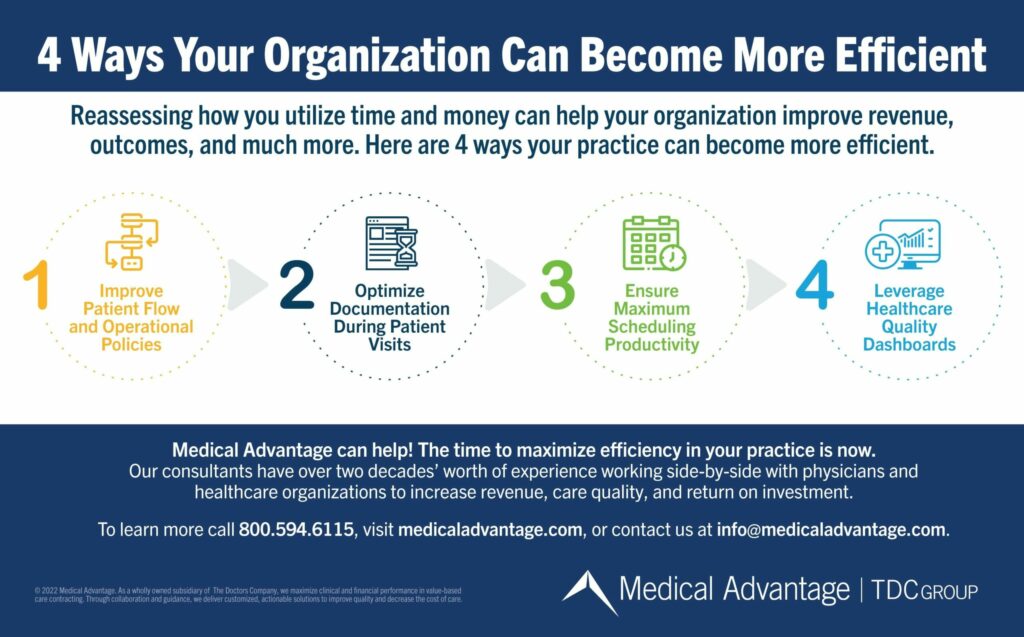1. Improve Operational Efficiency and Patient Flow
2. Optimize Data Entry During Patient Visits
3. Ensure Maximum Productivity with Scheduling Updates
4. Leverage Healthcare Quality Dashboards
5. Track Progress by Benchmarking
For healthcare organizations, efficiency and patient satisfaction are key to clinical quality and productive care delivery. As regulations and expectations continue to evolve, it can be challenging to maintain operational success without sacrificing quality or patient care. EHR (Electronic Health Record) quality dashboards provide insights that simplify tedious data entry and give real-time access to invaluable practice performance insights.
Our expert healthcare and IT consultants have spent decades assisting medical practices with healthcare quality improvement. From this experience, we have identified the following opportunities for workflow improvement within many healthcare organizations by using quality dashboards.
Improve Patient Flow and Operational Policies
Streamlined patient flow and comprehensive operational policies are essential for efficient healthcare. One of the most effective ways to gain visibility is by utilizing dashboards. By providing an overview of practice activities, dashboards allow providers and staff to quickly identify bottlenecks, prioritize duties and assignments, increase patient volumes, and manage resources effectively.
With healthcare quality dashboards, providers and staff also can – in real time – review task performance from the moment a patient enters the facility to when they check out so progress can be monitored against goals for efficiency. This provides the opportunity to respond to issues before they become critical while ensuring timely delivery of patient care.
Using those insights, practices can implement quality improvement initiatives that focus on optimized processes to significantly reduce the time associated with patient registration and insurance verification. In turn, staff will experience less burnout and providers can devote more time to patient care.
Optimize Documentation During Patient Visits
Healthcare dashboards provide quick access to medical history, patient treatment plans, as well as all the relevant diagnostics and laboratory results. This information can help practitioners make better informed decisions with less effort with everything at their fingertips in one organized place.
Additional benefits include secure patient health data storage and reliable accuracy for documentation during practice visits. Regulatory agencies and healthcare professionals can agree that protecting data and making it interoperable best serves the patient. Technologies like artificial intelligence (AI) are revolutionizing healthcare by providing instant access to vital patient information that enable providers to make faster, smarter decisions.
By utilizing AI-powered predictive analytics, providers can monitor real-time data, routinely assess an individual’s health, and detect potential risks in advance. Using this evidence-based, data-driven approach, providers find they are better prepared to quickly assess high-risk patient needs.
Ensure Maximum Scheduling Productivity
A key step in making sure a practice is running smoothly is to schedule appointments appropriately – maximize availability without jeopardizing care quality. Dashboards offer healthcare providers an effective and efficient way of managing their appointments by increasing clinic efficiency, providing better communication between care teams, and ensuring patient convenience.
Dashboard systems reduce redundant data entry while improving scheduling accuracy and access to important critical information in real time. They provide a single dashboard view of appointments for each provider-practice combination to streamline workflow management. With dashboards, staff can easily track the status of appointments, which gives them complete control over patient flow.
Finally, patients benefit from automated appointment reminders that help decrease no-show rates and ensure that they attend appointments on time. Overall, utilizing a dashboard system for scheduling maximizes productivity so that providers can boost their performance and improve the patient’s experience.
Leveraging Healthcare Quality Dashboards
By leveraging healthcare quality dashboards, providers gain real-time visibility into the effectiveness and efficiency of their practice. Dashboards provide actionable insights that enable medical teams to proactively identify and address performance improvement opportunities, improve compliance, reduce costs, and enhance patient satisfaction.
Analyzing key healthcare metrics can help providers identify unequal access to care or disparities to create more equitable systems of care delivery. Ultimately, healthcare data analysis is a critical component for driving higher-quality medical care that lives up to the needs of patients across all demographics.
Quality dashboards also are a powerful tool for quickly monitoring performance metrics such as patient wait times, treatment throughput times, staff utilization, and other key optimization areas. Using such dashboards can facilitate improved communication among departments and encourage greater collaboration in a practice’s operations—leading to an efficient and scalable healthcare business model that delivers optimum results.

Importance of Healthcare Data Analysis for Quality Improvement
When healthcare providers analyze patient data, they gain valuable insights into disease trends, patient outcomes, and inefficiencies within the system. By understanding this quantitative information, healthcare professionals can develop better clinical protocols and make better informed decisions that reduce costs and improve care.
Dashboards provide summary information illustrating trends, population health patterns, and patterns in performance to help identify areas for further deeper analysis. Through data analytics, healthcare practice staff members can monitor patient health outcomes and compare them to performance goals in order to measure the success of a medical practice’s operations.
In addition, dashboard analytics can provide a comprehensive overview of all the clinical operations within a practice. Insightful dashboard-based reports offer clear visibility of process improvements through comparative data analysis to support successful quality management initiatives and increase efficiency. Data analysis helps practices stay organized and efficient and deliver better care at lower cost, — thus an essential component of any quality improvement or optimization strategy.
What is Healthcare Quality Analytics?
Healthcare quality analytics is the science of evaluating and interpreting data from multiple dimensions to generate actionable insights into improving healthcare service delivery and outcomes. Quality analytics can cover a variety of activities, including assessment of medical practice performance and patient health outcomes. Quality analytics also enable providers to:
- Implement evidence-based guidelines
- Evaluate cost management
- Track progress against comparative benchmarks
By gaining a deeper understanding of healthcare performance patterns through quality analytics, providers gain insights that improve health outcomes while controlling costs.
Summary: Healthcare Quality Analytics
In the world of healthcare, data is king. The more data your organization can collect and strategically analyze, the better decisions you will be able to make concerning patient care. By using quality dashboards to leverage and best organize that data, medical practices can optimize documentation, improve flow, set appropriate policies, ensure maximum scheduling productivity, and allocate more time to patient care.
Get the Healthcare Dashboards That Work Best for Your Medical Practice
Unfortunately, improving medical practice efficiency is far from being a straightforward process. It includes addressing operational and workflow aspects, streamlining documentation processes, optimizing scheduling, plus developing customized dashboards for all the above. With time as the most precious resource, this undertaking can seem impossible for healthcare professionals to carry out.
Medical Advantage’s consultants have decades of experience in both healthcare and IT and work as an extension of your staff to help identify and implement strategies to improve the efficiency of your medical practice. Let us know how we can help optimize operations in your organization.





